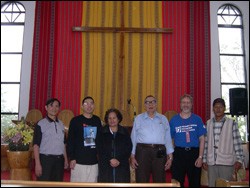Editor’s note: This is the 15th in a series of stories about congregations engaged in significant outreach and evangelism ministries, reflecting the General Assembly’s commitment to “Grow Christ’s Church Deep and Wide.” ― Jerry L. Van Marter
Thousands of miles and many cultures separate Alaska and Taiwan, but the divide isn’t stopping a group of Presbyterians in both places from coming together to draw strength and support from each another.
The Presbyterian Church (U.S.A.)’s Presbytery of Yukon has formed a partnership with the Presbyterian Church in Taiwan’s Tayal Presbytery, an effort designed to better serve each other’s indigenous communities.
“The task of the Christian community always is to embody ministry that Christ has set before us in a way that fits the context,” said the Rev. Curt Karns, executive presbyter of the Presbytery of Yukon.
This partnership, approved by the presbytery in February, allows two minority groups “to inspire one another with the values it takes ... to raise up a proper indigenous version of the church,” he said. It also reflects the 218th General Assembly’s commitment to “Grow Christ’s Church Deep and Wide” through the areas of evangelism, discipleship, servanthood and diversity.
Within the Presbytery of Yukon, which spans Alaska from Barrow in the north to Anchorage in the south and from Delta Junction in the east to St. Lawrence Island in the west, the indigenous people served are members of the St. Lawrence Island Yupik and Inupiaq communities.
They live in remote, off-road villages that can only be reached by airplane, and hunting and gathering are still a way of life.
“Culture becomes important in the village situations,” said the Rev. James Nageak, a retired Presbyterian pastor and a member of the Ahmaogak-Akootchook Memorial Parish (AAMP), whose six churches serve the Inupiaq.
Aywaan Parish, whose three churches serve the St. Lawrence Island Yupik, also resides within the Presbytery of Yukon.
An emphasis on culture is essential for those within Tayal Presbytery as well. Values such as generosity and sharing among tribal members are stressed and internalized at a young age, said the Rev. Nathan Lim, pastor of Anchor Presbyterian Church in Anchorage, Alaska.
Yet at the same time, the traditional way of life is dwindling for indigenous people in both the Presbytery of Yukon and Tayal Presbytery, said Lim, a native of Taiwan and the former pastor of Alaska’s remote Gambell Presbyterian Church.
Through this partnership, the presbyteries can come together “to combat the dwindling process of the smaller communities,” he said. “It seemed to be really natural.”
Tayal Presbytery already has a track record of addressing critical issues such as the loss of the indigenous language and the need to train leaders from their own ranks — both of which are concerns among the indigenous people within the Presbytery of Yukon.
Among other things, language classes were started for people in the community, which is reviving the overall use of the language, Nageak said.
“That is what we hope will happen,” he said. “This is an opportunity to look at how they (Tayal Presbytery) are being successful.”
“They actually put together a seminary for them,” providing a way of teaching that is Presbyterian, but also done so by indigenous people and for indigenous people, Karns said.
Hundreds of Tayal’s pastors are trained, ultimately enabling the church there to be self led and self supporting, Lim said. The hope is that the Presbytery of Yukon can learn to identify potential leaders in the church early on and then provide nurture and training like what is done in Tayal Presbytery.
“It can ensure the viability of the tribe and also the spiritual community,” said Lim, who has been involved with the developing partnership.
Other collaborative efforts via the partnership might include pulpit exchanges and perhaps even seminary training in Taiwan for individuals from Yukon presbytery.
“This is something that God has prepared the way for,” said Karns. “If God is present, then there are all sorts of possibilities.”

